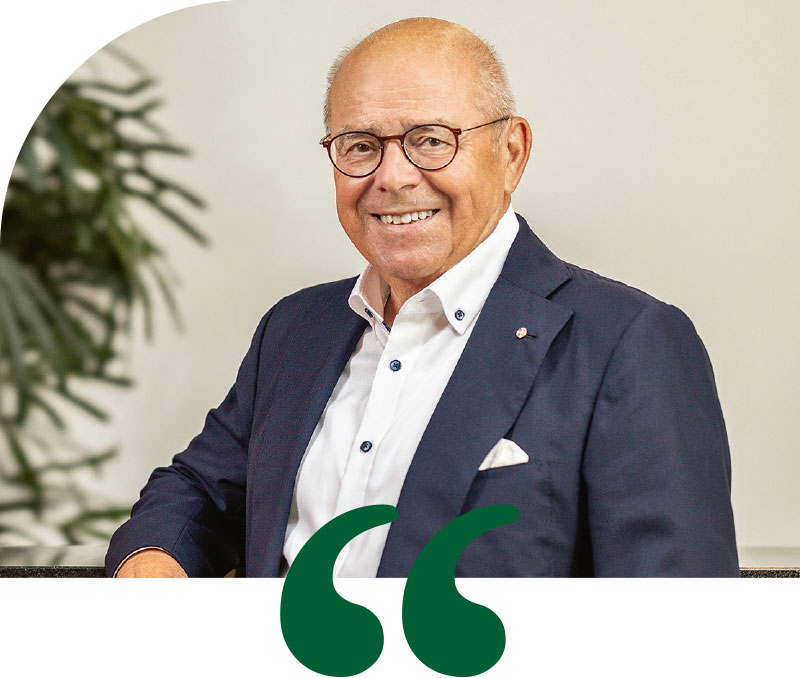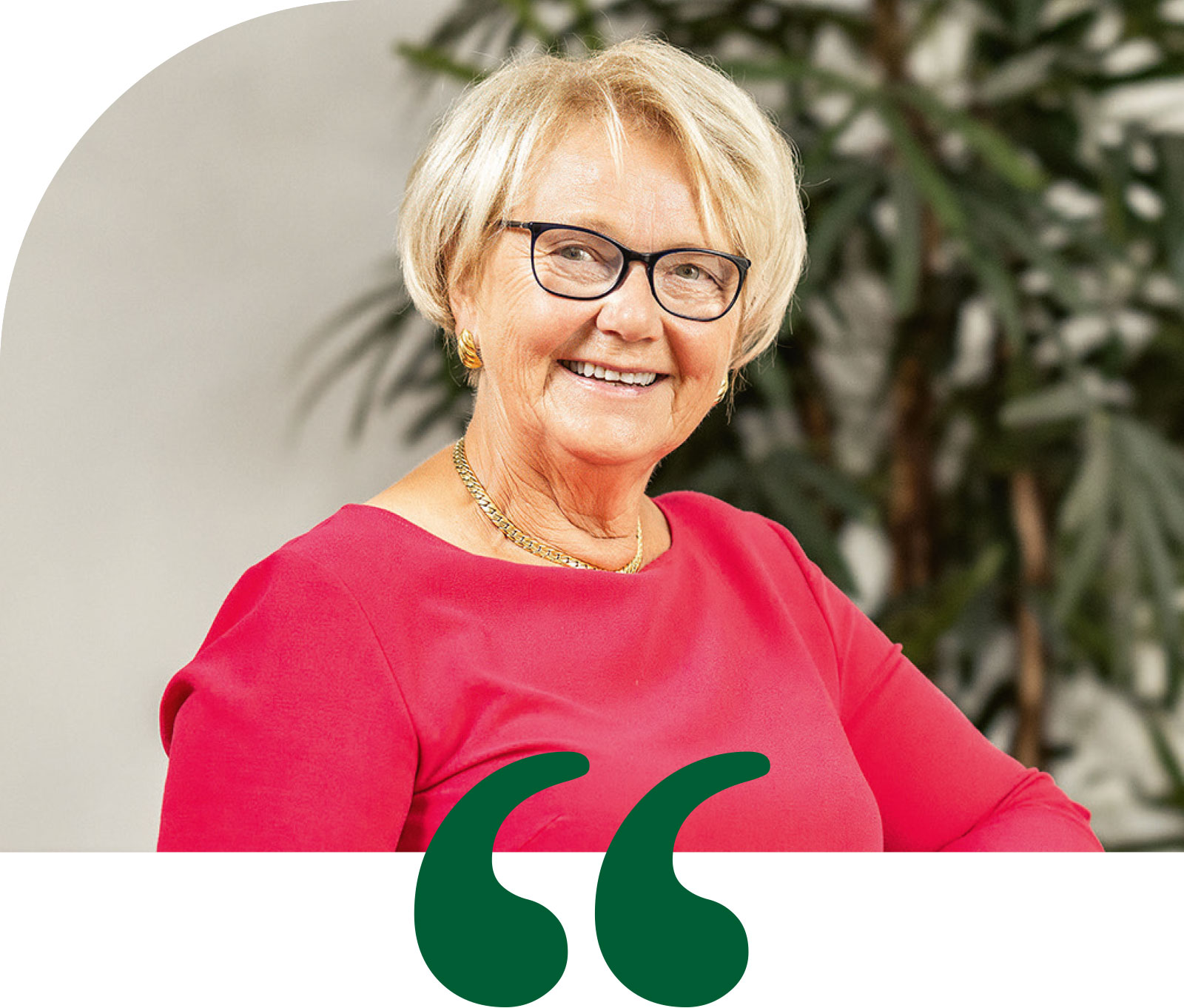INTERVIEW
THREE GENERATIONS OF THE GÖPFERT FAMILY SHARE THEIR INSIGHTS
Karl F. und Siglinde Göpfert Esther Göpfert André Göpfert Marie-Luise Göpfert und Florian Göpfert
“We have always upheld certain values and strived to live by them –so that others may be inspired to do the same.”
KARL F. UND SIGLINDE GÖPFERT
“We have always upheld certain values and strived to live by them –so that others may be inspired to do the same.”

We stumbled into this field by chance, but we couldn’t have found a better niche.
Karl F. Göpfert
When you drive to work in the morning, how do you feel?
Siglinde Göpfert: Happy and content. I look forward to coming here every day.
Karl F. Göpfert: When I drive to work in the morning, I often think to myself: maybe I didn’t do everything wrong after all. What roles do you both play in the company?
Siglinde Göpfert: I’ve been responsible for purchasing for many years. In the early days, we were just a small team, and I helped out wherever I could – whether it was wallpapering, making things look nice, or cutting construction plans and dealing with sal ammoniac to develop technical drawings. Looking back, it’s incredible how much has changed. Today, computers handle many of those tasks. Back then, my husband wrote the programs by hand, and I typed them onto punched tape. If I made a mistake at the very end, I had to start all over again. It really was pioneering work.
Karl F. Göpfert: I'd like to add something –my wife is very modest: behind every strong man, there’s often an even stronger woman.
You built the company together and brought it to where it is today. Was your partnership also a key to your success?
Karl F. Göpfert: Absolutely. We’ve always stood for certain values and made a point of living by them – so others could follow our example. I believe we’ve succeeded in doing that. What can you always count on your husband for?
Siglinde Göpfert: Whenever I need him, he’s there for me. Of course, in the early years, he was often away on business trips, and I had to take care of the children. But we always made it work. The family was always my top priority. That’s why we often worked at night – when the children were asleep.
Karl F. Göpfert: I feel the same way. What defines my wife is her honesty and reliability. Those qualities have always held us together. Do you remember working with your father? Karl F. Göpfert: I always say: there was never a generation gap in our company. As a child, I had to sweep the workshop – of course, not something a kid enjoys. But it shaped me, and I never complained. My father and I handled the generational transition without any drama. Naturally, as a young engineer, I wanted to change a lot of things.
Siglinde Göpfert: There were certainly challenges.
Karl F. Göpfert: And I always wanted to reinvent the wheel. One day, my father said to me: “If you know everything better, then do it better.” With that, he handed over full responsibility for the company to me. When you look back on your company’s history, what impresses you the most?
Siglinde Göpfert: That we managed to grow a small craft business with just four or five employees into such a successful company – despite all the challenges we’ve had to face along the way.
Karl F. Göpfert: What impresses me most is the freedom that comes with being an entrepreneur – the ability to make your own decisions. But with that freedom also comes great responsibility. When I look at what the company has become today, I feel genuinely satisfied.

I hope the company remains successful in the years to come. For my children and grandchildren, I wish they have the same fortunate touch that we’ve had.
Siglinde Göpfert
What went through your mind when you completed the design of a machine?
Karl F. Göpfert: Honestly, back then, when everything had to be drawn by hand with the tools we had, I often had a sense of unease – wondering whether it would all work as planned. Due to time constraints, you could often only design parts of the machine and never see the complete system as you can today with CAD. As a young engineer, you make mistakes – it’s part of the process. For me, it was important to admit those mistakes. Fortunately, I had a great team around me, and together we corrected them. Over time, the mistakes became fewer and fewer.
Which machine would you consider your masterpiece?
Karl F. Göpfert: Do I have a masterpiece?
Siglinde Göpfert: Yes, definitely—several! The SRE Boxmaker stands out in particular. That was a real milestone.
Karl F. Göpfert: The Short Run Boxmaker was certainly a big step forward for the company. We really broke new ground with that machine. It wasn’t a huge financial success, but it established our reputation. The next major breakthrough was the RDC Evolution, a direct-drive printing and die-cutting machine. I’m not sure I’d call that a masterpiece, though.
Siglinde Göpfert: I would. All of those machines are masterpieces in their own right. That’s why we’ve come so far.
What moments of happiness in your career do you remember most fondly?
Karl F. Göpfert: For me, it‘s always that moment when a newly developed machine is successfully sold and the market embraces it. That gives me a genuine sense of fulfillment.
Siglinde Göpfert: I wouldn’t describe it as moments of happiness in that sense. But I’m grateful that things have turned out so well for us over the years.
What fascinates you about corrugated cardboard as a material?
Karl F. Göpfert: We stumbled into this field more or less by chance—but we couldn’t have found a better niche. Sustainability is more important today than ever before, and corrugated cardboard has become essential in the packaging industry. It’s fully recyclable and can be reused dozens of times – sometimes up to 90 cycles or more. The demand for corrugated cardboard will likely continue to grow. Is that why you’re not worried about the company’s future?
Karl F. Göpfert: Exactly. If we were working with plastics, it would be a different story – those rely on fossil resources, consume a lot of energy, and still pose major disposal issues. Corrugated cardboard, on the other hand, is a sustainable material and that gives us confidence in the future. We‘ve talked about the product. Let’s talk about the people behind it. What matters most to you in your relationships with employees, customers, and suppliers?
Siglinde Göpfert: Openness, honesty, and no games. As a Purchasing Manager, I’m not the type to say, “take it or leave it.” It’s always about give and take – about finding the best possible outcome for both sides. I also believe in speaking plainly and directly. You‘ll have to ask my employees about that (laughs). But I think they know how to deal with me by now.
Karl F. Göpfert: You’ve put it well. Partnership-based relationships are everything. Our customers know they can rely on us – and that we respond quickly if something goes wrong, without asking for an order number first.
Siglinde Göpfert: I expect the same kind of dependability from our suppliers. And I know I can count on them – especially when things get tight.
Karl F. Göpfert: A good example of that was during the coronavirus pandemic. While many companies struggled with supply shortages, we didn’t – because we’ve built strong, long-term partnerships over decades. Would you say this way of working with people is part of the values passed on by your parents?
Siglinde Göpfert: Absolutely. My father had a big influence on me – those values were always part of our upbringing.
Karl F. Göpfert: And in our family today, it’s really my wife who has shaped and carried forward those values.
What advice have you given your children?
Siglinde Göpfert: Not much, actually. Of course I offer advice, but honestly – what’s the point? There’s a saying: “Why raise your children? They’ll just imitate what you do anyway.”
Karl F. Göpfert: That’s true – if you’re doing it right.
Siglinde Göpfert: So far, it seems to be working. Even our older grandchildren are already involved in the company. Over 90 percent of all companies in Germany are family-owned, which underscores the importance of family – something that also applies to your company. What particular care must be taken in a family-run business?
Karl F. Göpfert: It’s crucial to preserve certain values. Especially today, with all the talk about Generation Z, it’s apparent that many companies have lost sight of these values. For us, honesty, reliability, and hard work are at the core of everything we do – both towards each other and, most importantly, towards our customers. This reminds me of a saying that has always stayed with me: “Think about who pays your salary – it’s the customer.” We have a duty to them. Without customers, there’s no revenue. I could share many more principles and insights that are key to long-term success, but there are four fundamental points that have guided me throughout my career: First, we must develop the best machines in our class. Second, our goal is to have the most satisfied customers. Third, we need motivated, well-trained employees. Fourth, we must provide outstanding service that goes far beyond just delivering a machine. If we consistently adhere to these principles, the orders will follow – provided the economic conditions are favorable. Right now, we‘re in the midst of a global economic crisis, and many companies are holding back on investments. Everyone is waiting for the situation to stabilize. That paints a picture of the current state. Looking at the longer term, what are your hopes for the company and your family’s future?
Siglinde Göpfert: I hope the company remains successful in the years to come. For my children and grandchildren, I wish they have the same fortunate touch that we’ve had.
Karl F. Göpfert: As companies grow, structures evolve. In the past, when we had 50 or 100 employees, decisions could be made quickly and directly. It’s important for a larger company not to lose that decisiveness, which is why you need people who aren’t afraid to make decisions. Fortunately, as a family, we can still act swiftly, making decisions in family councils without needing to crunch numbers every time. A good gut feeling is often decisive.
Siglinde Göpfert: You mean your gut feeling.
Karl F. Göpfert: Yes, but unfortunately that can’t be cloned.